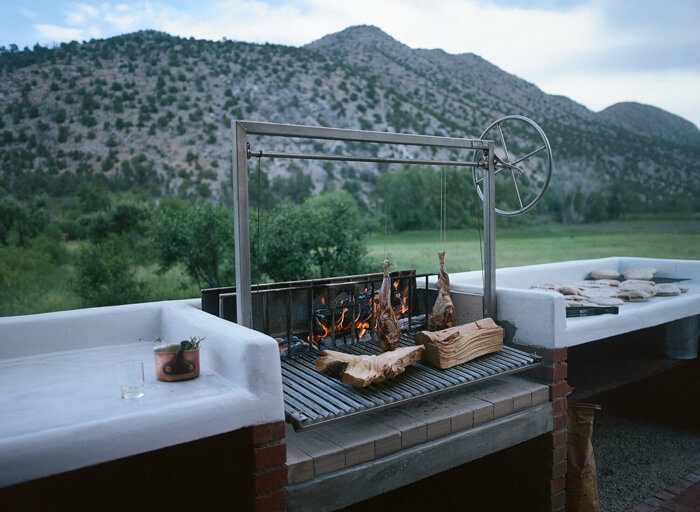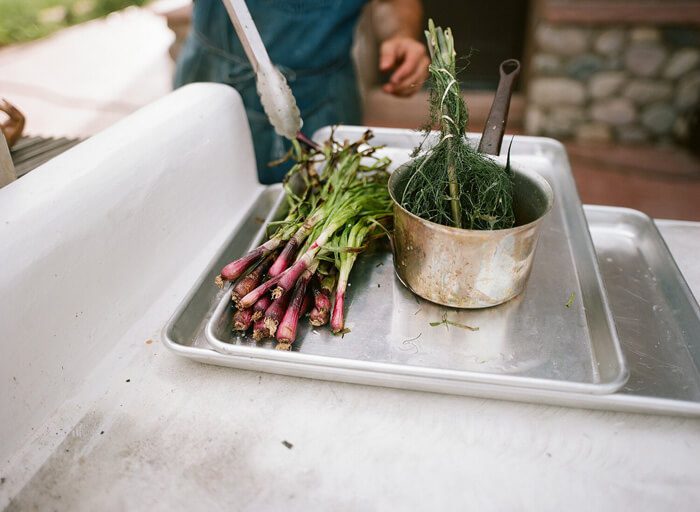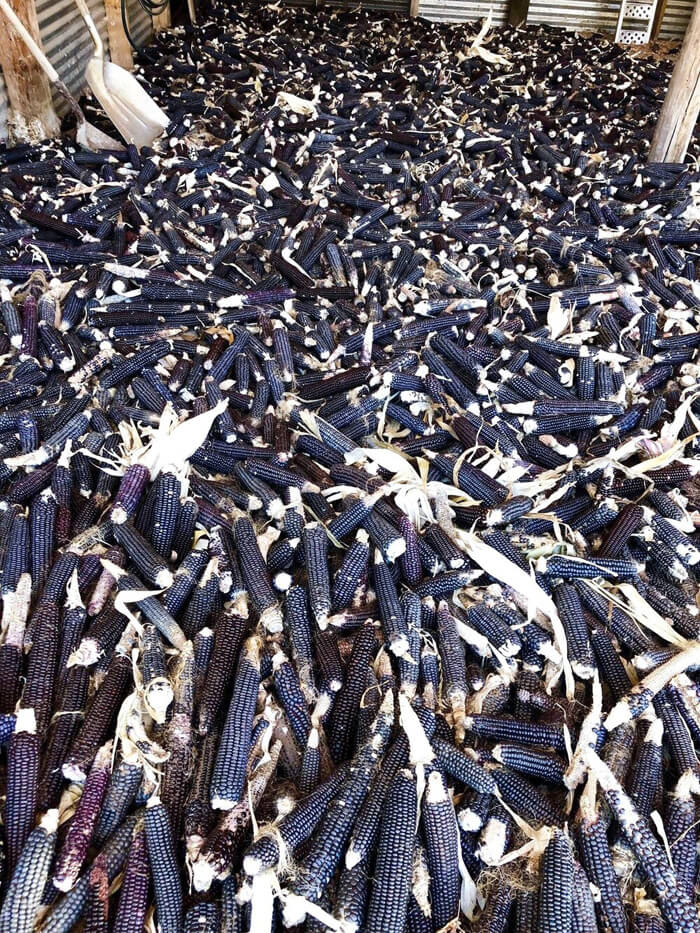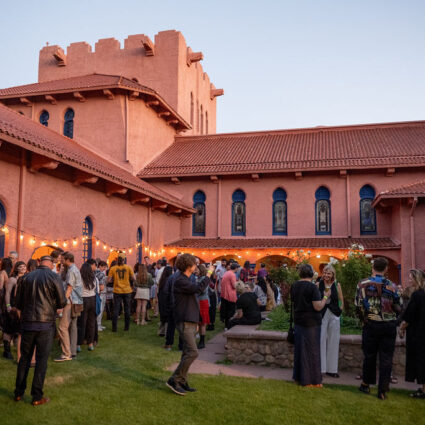“Uncharted” is an interview series created in light of the COVID-19 pandemic. We’re talking to people in the New Mexico arts world and beyond to see how the community is navigating this unprecedented health crisis. This interview has been edited for length and clarity.

Owl Peak Farm, in La Madera, New Mexico, is a nonprofit organization run by C.C. Culver. At the center of Owl Peak Farm’s efforts is the emphasis of caring for the community and the land, restoring soil, and in recent years, working to renew grain production in New Mexico. The farm’s philosophy is inspired by acclaimed potter Felipe Ortega, a dear friend of Culver’s who passed away in 2018. As Culver writes, Ortega believed in “the inter-relatedness of all things, a ‘debt’ he owed to everything that surrounded him, from the clay with which he made his pots, to the flour with which he baked his bread.” Encouraged by Ortega to buy her first farm property (there are now three), she continues to honor his friendship and legacy with Owl Peak Farms.
In 2019, Culver teamed up with farmer and cook Marjory Sweet to create an on-site dinner program, offering meals to the community and beyond in a pay-as-you-can system. While the program has adjusted to the pandemic with relatively little upheaval, staying nimble in the face of unexpected and uncontrollable situations is nothing new when working with nature. We spoke with Culver and Sweet about the dinner program, the farm, and rolling with the punches.
What is the history of the farm, and how you came to run it?
C.C. Culver: It’s never something that I thought I would be doing. My background is art—and many other things—and it was that kind of a vision, that I can look at something and have the capacity to see what the land needed, how it worked with the community, as this big canvas. My original intention was to restore small farming in small rural towns. What Felipe Ortega did, and what I found so important, was the coming together of community and people around the table and around food, and that sense of welcoming inclusiveness. In 2006, I bought some property in La Madera, a small village of about 100 people, and it has developed into what I own today.

How has the farm had to shift since the pandemic?
Culver: I think this year has helped us focus what we’ve been doing, and eliminate a lot of the things that weren’t working, although that happens every year in farming. I work with Marjory Sweet now, who has brought in a wonderful piece—we grow produce, but you have to figure out how you distribute, process, and offer it, so she has taken over the meal part, offering it to the community. The other piece we added in the last six months is a coffee shop on the farm. It’s fantastic, one of the best things that we’ve done. Linda Garcia, a local, runs it from 6 am to 11 am Monday through Friday. It’s a place for people to come. People are so isolated and independent, it’s important to have a place where people feel comfortable coming to, to enjoy where they live.
Marjory Sweet: When COVID hit, we actually first welcomed a group of St. John’s students onto the farm who had been displaced by the situation, and needed an environment to finish out their semester. So we did this slightly experimental satellite school for St. John’s students, and I cooked for them through that time.
Culver: There were sixteen students. They took over all the farm spaces—I have three properties with three buildings where they lived and finished out their last months of schooling. They had no idea where they were, they didn’t recognize themselves. When I look back it was a stunning few months. I had to move out—I couldn’t be there except to come to check on stuff, because they were in every nook and cranny of the farm. The whole farm became little offices with big whiteboards all over the place. The fact that they could finish their schooling, maintain everyday life, was a miracle.
Sweet: While that was going on it gave us time to brainstorm how to manage the farm dinners, which was a slow, thoughtful process. We came to the conclusion that it really wouldn’t be so difficult to put the food in boxes and have people sign up online, and the essential pieces would still be in place, which is that you’re coming to the farm and experiencing the land, so it didn’t feel like we had to compromise too much.

What was the initial inspiration for the farm dinners?
Sweet: The dinners are a nice way to open the farm to the public a couple of times a month and bring people onto the property and give them a glimpse of what we do and what we grow. I think the dinners really embody Owl Peak’s mission, which is to intersect community, agriculture, and land conservation.
And how have the dinners changed with the pandemic? Have any positive surprises arisen?
Sweet: It still feels preferable to have a communal meal where everyone is free to socialize, so I think one positive is these sort of behind-the-scenes logistics, which isn’t very poetic, but having people sign up and pay online is better for us—it’s more organized and easier to control.
I think the best thing that has come of it is we realized we’re really lucky because we’re not a restaurant, we’re this unique place, and at a time when there are so few options for getting food out, or gathering somewhere, it makes us realize what an amazing resource we have in the farm. Whether there’s a pandemic or not, or other challenging circumstances, it seems like the project we’re doing feels resilient in a unique way.

Given the unpredictable nature of farming, you’re probably used to rolling with the punches in the way that many people are learning now, due to the pandemic.
Culver: I am. There was one year I called “the year of the plagues.” We dealt with insects, drought, and flooding. You plant and you never know from year to year if that’s going to be a successful thing or not. That’s when the team really comes in—they make it easier to find solutions and have the calmness to pretty much handle disasters.
With the team I’ve been able to build and do what I do, I couldn’t do it without them. I have a partner, Roberto, who builds the adobes and does the construction, the fields. He’s from Chihuahua, he can handle anything and has this Buddha-like calmness.
A lot is really about relationships. First, it’s restoring the soil, and there’s nothing more beautiful than that. To see the animals respond, the insects respond, plants respond, then to have people that you can lean on and trust. The rest is pretty much designing it year by year.
Besides the dinners, what projects are you working on at the farm now and going into the fall?
Culver: We’re going to close down the meals for the season in October, so we have the winter to finish construction, deal with the fields, and think about where we’re headed. We just finished a new processing area: we have mills for blue corn, we have the cider press, the garlic peeler, so the next step is to process these things for storage. We will eventually have a small market at the farm, and that will be more centered on the community and a pay-as-you-can type thing.
I’m just glad to be in the position that we’re in—good team, good soil, and we can go forward now in finding that niche of specialty grains and seed. We seem to be in a very good position now to continue in what will be very important—this smaller, local economy around food.





